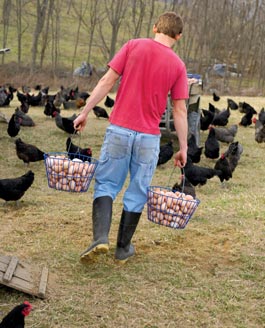
For Peter Singer, the unexamined meal is not worth eating. Over the past three decades, the Australian philosopher has challenged the idea that eating is simply a matter of convenience or enjoyment, making a case that it is a profound ethical choice—particularly if you’re a meat eater. In 1975 he published Animal Liberation, a pioneering defense of the rights of animals that concluded that veganism is the most ethically justifiable diet. The book established Singer as the intellectual godfather of the animal rights movement and, as an Oxford philosophy lecturer put it, took what had been viewed as “the concern of eccentrics and little old ladies with too many cats” and transformed it into a “respectable moral cause.”
Singer may have helped legitimize the idea that meat is murder, but try telling that to most Americans. Only six percent say they’re vegetarian or vegan, and while the demand for organic food is booming, the vast majority continues to consume the “standard American diet” of cheap meat and processed food. In his latest book, The Way We Eat: Why Our Food Choices Matter, Singer (with co-author Jim Mason) turns his sights on the American way of dining, applying his ethical calculus to the eating habits of three families—ranging from meat-and-potatoes Wal-Mart shoppers to Whole Foodies and hardcore vegans. With a mix of quiet philosophizing and Fast Food Nation-style reportage, Singer argues that eating well means looking beyond the plate and taking a hard look where our food comes from and how it affects other people, animals, and the environment. He isn’t advocating that Americans become a nation of militant vegans, however. He even cuts meat eaters some slack—so long as they avoid factory farmed meat—and reassures readers that interrogating their food choices need not be done dogmatically: “Food is an ethical issue—but you don’t have to be fanatical about it.”
This contrast between the radicalism of Singer’s core philosophy and the nuanced way he puts it into practice is The Way We Eat’s biggest surprise. Singer is not a knee-jerk foe of the food industry, nor does he give the organic and local food movement a free ride. He writes favorably about companies that have made efforts to break away from the industrial food chain, such as Chipotle, a burrito chain owned by McDonald’s, which has made efforts to buy more organic vegetables and sustainably-raised meat. Likewise, Singer is critical of the notion that local farming is a cure-all for the abuses of industrial farming, and is quick to point out it may come with its own negative impacts. For instance, what’s more fuel efficient—driving an hour to buy apples at a nearby farm or driving to the local supermarket to do a week’s worth of grocery shopping? In short, Singer’s not afraid of market solutions or globalized agriculture—so long as they work within his carefully delineated ethical framework.
That’s not to say that The Way We Eat doesn’t pose profound dilemmas for anyone who cares about the environmental, social, and moral consequences of what they eat—particularly if you’re what Singer calls a “conscientious carnivore.” Though Michael Pollan (who’s been engaged in a mini-feud with Singer over animal rights) has written cheekily of reading Animal Liberation while tucking into a steak, only the most steel-stomached meat eater will get through The Way We Eat’s discussions of intensive animal farming without a twinge of disgust or guilt. As Pollan conceded at a recent appearance, “You have to defeat [Singer’s] arguments or stop eating meat.”
Singer is currently professor of bioethics at Princeton University and laureate professor at University of Melbourne. MotherJones.com recently spoke with him about his new book, his disagreements with Pollan, and why he thinks obesity is unethical.
MotherJones.com: You’re probably the world’s best known utilitarian philosopher. Can you briefly explain what it means to be a utilitarian and how that applies to food?
Peter Singer: To be a utilitarian means that you judge actions as right or wrong in accordance with whether they have good consequences. So you try to do what will have the best consequences for all of those affected. When it comes to food it means that obviously you look not only at whether you enjoy what you’re eating but also what you’re contributing to and supporting with your food purchases. That’s of particular concern where you’re contributing to or supporting a system that abuses animals, that damages the environment, that’s harmful to workers, and so on. I think a lot of the food produced in America, particularly factory farmed or intensively farmed animal products, is in that category.
MJ: You write that local food often is the most ethical choice, but isn’t always necessarily the most ethical choice. Why is that?
PS: You have to ask yourself what’s particularly good about being local. People say, “Well, I want to support my local economy.” But if you’re living in a prosperous part of the United States, what’s really ethical about supporting the economy around you rather than, say, buying fairly traded produce from Bangladesh, where you might be supporting smaller, poorer farmers who need a market for their goods? So I think that just in terms of supporting your local economy, I’d say no, you should support the economy where your dollars are needed most. But then people will say, “Yes, but there’s all the fossil fuel used in shipping it over from Bangladesh or wherever.” But people often don’t realize that if you’re shipping something like rice by sea, the fuel costs are extremely low. Shipping is a very efficient way of transporting. It may be that if you’re buying rice in California, the rice from Bangladesh has used less fossil fuel than California rice, even counting what it takes to get there. We also found that when we looked at tomatoes produced in New Jersey early in the season by being grown on heat, when you calculate the amount of oil that goes into heating the greenhouses, it turns out that you could have trucked them up from Florida with a similar amount of oil. If people are prepared to eat locally and seasonally, then they probably do pretty well in terms of environmental impact. But there’s not many people who live in the northern states of the U.S. who will say, “I’m not going to have any tomatoes between November and July.” So I think there’s a certain amount of double talk about local food that’s just too rosy.
MJ: But if you’re concerned about animal welfare, one argument for local food is that farmers who know that their customers will be coming out to the farm are less likely to treat their animals badly.
PS: If you’re buying animal products and can go to the farm and actually see how the animals are looked after, yes, that’s an important point. That’s definitely the best way of assuring yourself that the animals are being well treated. But again, that example just shows that you need to be more specific than just saying, “Buy local.” Because you might buy local at your farmers’ market but perhaps [the farmer] is selling eggs from hens that are kept in cages in a shed. That’s still local food. There’s local and there’s local, and if you are buying local and are concerned about these ethical issues you really need to be inquiring, or best of all, inspecting for yourself.
MJ: In his new book, Michael Pollan writes about an exchange he had with you about the ethics of eating meat.
PS: Right, and I have part of a chapter that discusses his arguments as well.
MJ: One argument that he has put forward is that while being eaten is not in an individual animal’s interest, from the standpoint of the species, domesticated animals owe their existence to humans having a need for them. If everyone became vegan, cows would go extinct. What’s your response to this idea?
PS: I think there’s a bit of confusion in this argument about doing things for the good of the species. The species isn’t really a conscious being. But if he’s saying that it’s good that there are more cows around, I think that depends on how the cows are treated. Perhaps we’d actually end up with some measure of agreement that it’s only good for there to be cows around if these cows are leading good lives. But I think the majority of cows, and even more so chickens and pigs, are leading pretty miserable lives.
MJ: You argue that we should look at animals as individual beings, yet some would say that our concept of individual morality and rights only should apply to interactions between humans, not the human desire to eat animals. As Pollan writes, “We may simply require a different set of ethics to guide our dealings with the natural world, one as well suited to the particular needs of plants and animals and habitats… as rights seem to suit us and serve our purposes.”
PS: I’m a bit puzzled that he would think modern farming is the natural world. I don’t understand the notion that modern farming is anything do to with nature. It’s a pretty gross interference with nature. I think it ought to be governed by the standards of how it affects the individual animals, just as we’d want to deal with institutions that deal with humans by how they affect individual humans.
MJ: Do you think there can be such thing as what Pollan describes as a “good farm”—a farm where animals live happy lives and are slaughtered with a minimum of suffering?
PS: Yes, I think it’s possible. But I think it’s rarer than Pollan thinks. He refers to Joel Salatin’s farm as a model of a good farm. I’ve had other reports about that farm and I don’t think it’s nearly as good as Pollan is suggesting. The hens that are in the fields are actually in small wire pens that get moved around on the grass; they’re pretty restrictive. It’s a lot better than the standard intensive farm, but it doesn’t meet my standards of a good farm.
MJ: Have you been to Salatin’s farm?
PS: No, I haven’t. But one of my researchers has. There’s another guy who’s got a book about raising poultry outdoors [Herman Beck-Chenoweth, author of Free Range Poultry Production and Marketing] who talks about the system that Salatin uses for his hens and describes it as one of the worst of the methods of raising poultry outdoors—[he’s] not comparing it to the factory cage, of course. He says it’s like a cage with a grass floor.
MJ: When you take the suffering of animals or factory farming into consideration, what role, if any, does the personal enjoyment of food play? Is enjoying a steak secondary to the ethical problems with eating a corn-fed cow?
PS: I think it is. I’m not saying that enjoyment isn’t legitimate. But I think that compared to what the cow or steer has been through and compared to the impact you’re having on the environment, I think your enjoyment of the steak is secondary. Don’t forget, it’s the net difference between your enjoyment of the steak and your enjoyment of whatever else you’d be eating instead. So I hope you’ll find something else—there’s lots of great vegetarian or vegan food that you can eat that will be tasty and, once you develop a taste for it, probably will enjoy as much as you enjoy the steak, anyway.
MJ: Some people who want to eat ethically will probably feel that they’ll never be able to live up to the ideal. What can people realistically aspire to?
PS: I do want to emphasize that I don’t think eating ethically, particularly from a utilitarian point of view, is a matter of saying, “Here’s this strict law that I have to do everything possible comply with.” I think we can be ethically conscientious and recognize that sometimes there are going to be compromises. Sometimes it’s going to be very difficult, very inconvenient, to get the best choice, so we’ll settle for something else. As you were saying before with the steak, there’s a little bit of room for indulgence in all of our lives. I know some people who are vegan in their homes but if they’re going out to a fancy restaurant, they allow themselves the luxury of not being vegan that evening. I don’t see anything really wrong with that. If what they’re doing nine days out of ten is good, I’m not going to criticize them for being less than perfect on the tenth day. Sure, you’ll make mistakes, but don’t flagellate yourself if you do.
MJ: Do you eat meat? If not, are you vegan?
PS: I don’t eat meat. I’ve been a vegetarian since 1971. I’ve gradually become increasingly vegan. I am largely vegan but I’m a flexible vegan. I don’t go to the supermarket and buy non-vegan stuff for myself. But when I’m traveling or going to other people’s places I will be quite happy to eat vegetarian rather than vegan.
MJ: I thought it was quite interesting that you write pretty favorably about Chipotle. Seeing as they’re funded by McDonalds, I imagine many people who consider themselves ethical eaters would be loath to eat there. It seems that you ultimately see solutions in what larger companies can do to change where they get their food from, instead of just taking the local approach of getting your local farmer to be humane and sustainable.
PS: I think we have to work with the tools we have. In the United States the market is probably the best tool that we have to produce change. If I were writing in Europe, I might think that the political system is more useful as a way of bringing about change. But in this country, the political system has not shown itself to be responsive to consumer demand when it challenges major businesses like agribusiness. While maybe that will change, at the moment if we want to get—to use Chipotle as an example—more pigs outdoors, not confined indoors in factory farms, one way of doing that is by consumers switching their consumer choices from chains that sell factory farmed pork to chains that sell humanely raised pork. If Chipotle’s doing that, well, good; I hope more people go there and switch their patronage to them because of it.
MJ: You write briefly about the ethics of obesity and suggest that we revive the idea that gluttony is a bad thing. Why?
PS: When you look at food as an ethical issue in the Christian tradition, you don’t find very much about it. You don’t find, as you do in the Jewish or Islamic or Hindu traditions, a lot of restrictions saying you can eat this but you can’t eat that. But what you do find is this idea that gluttony is a sin and that it’s something that we ought to be ashamed of. But it’s interesting that although the United States sees itself as a very Christian country, this something that is not talked about very much. Christian leaders talk about a variety of sins, but gluttony is generally not one of them. If you look at their congregations, often you can see why, because many of the members are pretty grossly obese. I think that this is something that we need to think about. It is related to the impact we are making on the planet. Somebody who eats twice as much factory-farmed products as he or she needs to is clearly doing twice as much damage. From a utilitarian point of view, that’s twice as bad.
Dave Gilson is the associate editor of Mother Jones.















